- Home
- Giles Foden
Zanzibar Page 14
Zanzibar Read online
Page 14
‘Praise be to Allah, Lord of the two worlds …’
* * *
High above the three men, higher than the ceiling, higher than the flat roof and the forest of kites over Peshawar, higher and knowing and seeing – but not omniscient – spun the machinery of satellite reconnaissance of the United States government. A few days previously, before the battered green minibus had left the camp, a long-range camera had taken a digital photograph of the vehicle. It had just taken another picture of the vehicle, outside the hotel in Peshawar, and this had provoked a reaction.
Passing the information through various critical filters, the computer that controlled the camera determined whether it was worth forwarding to intelligence analysts. Since one of the filters tested the movement of vehicles, the program for forwarding began to run. An encrypted message flashed its way from a joint NSA/CIA data-collection facility to the desks of a number of US officials.
These included Jack Queller. As part of the consultancy package he had hammered out with the CIA when he retired, he had the full complement of communications equipment installed in his home office in the cabin on Aquinnah. For all that, he still communicated in more traditional ways as well. The island was in the south-west corner of the Vineyard, near enough to the Haven for him to pick up his mail every morning in his modest speedboat. There was rarely much – statements from his broker, occasional copies of the journals to which he subscribed. But he liked to make the trip, just to prevent himself from getting too solitary.
There were two fishermen he drank with, Lanford Bourne and Todd Stubens, but otherwise he didn’t mix. Especially not with all the people who were coming in from New York and building houses in the area. There had lately been some trouble between a real-estate developer and the local Native American lobby, which was Wampanoag and fairly militant.
Half Wampanoag himself, Todd had an old Navy lighter from which he ran lobster lines. Queller loved this boat and sometimes the two of them would go out together to check no one had been messing with the trap lines. Todd liked to do this in the early morning. Then, when the place was quiet, you got a real sense of what the Haven must have been like in the old days, when it was full of tall ships – whalers and slavers, traders from Europe and the East. Todd had given Queller an old harpoon point he had found in a cove. It took pride of place on the window sill in his lounge, next to a photograph of Lucy.
That was where he was now, surrounded by bookshelves and wearing only his boxer shorts. As the ‘incoming message’ tone sounded on his computer and the corresponding dialogue box appeared on the screen – ‘You have new mail, open mail?’ – he was lying on the sofa reading, as he did every morning, a verse from Omar or one of the other great Persian poets.
Putting down the book, Queller went over to the computer and affirmed the dialogue prompt. With his hand on the back of the swivel chair, he read the message, taking notice of the co-respondents. These changed according to the status and subject area of the message.
To: Jack Queller
cc: Mort Altenburg, Sylvia Chavez, Edwin Elliott
From: Data collection
Subject: al-Qaida activity
Message: View portal 99142/3/A and advise. Control decision: Altenburg.
Frowning when he saw the last part of the message, Queller spun the chair round and went through to the kitchen to fix himself some breakfast. It made him feel low to have to file his reports to a younger man. Altenburg had a mere fraction of his experience of terrorism and hostage-taking, yet supposed himself an expert. He put some bread in the toaster and turned on the kettle. Whatever was in the message, it could wait. He felt his stump twitch with pain, as if the glowing bars of the toaster had been pressed against it. The cut nerves hurt like this from time to time; the cause was partly physiological, partly psychosomatic – but the pain, that was always the same.
He had, he felt, good reason to be down on Altenburg. The FBI man had recently vetoed an operation he had half set up and wanted to run ‘dark’ through the Counter-Terrorism Group. He had persuaded the representatives of two oil companies (both former agency men, as so many in the oil business were) to put up $500,000 each for a speculative unofficial project. Queller would fix them up with 30,000 square kilometres of concessions through a contact of his in Sudan. He planned to use the money to set up an unofficial operation to kill Osama bin Laden. But – even though the money was sitting in an escrow account in London and things were ready to roll – Altenburg had blocked the plan. Furious, Queller was sorely tempted to run the operation privately. He was an adept of dark ops, however, and knew that they tended to go wrong without covert official backing. Only agencies had the resources, deniable and undeniable, to run such things in a proper fashion.
Queller had another reason to dislike Altenburg. He suspected him of scheming to terminate his consultancy contract. Officially, they both came under the aegis of the recently established Counter-Terrorism Group, whose inter-agency team of officers produced tactical intelligence with the aim of thwarting terrorist attacks. The CTG itself came under the direction of Secretary of State Albright – with whom Queller was on familiar terms – but she couldn’t be drawn into a dispute of this nature, a dispute that wasn’t even supposed to exist. It was a fiction that State took the lead in the CTG anyway. There was the usual power vacuum of an inter-agency function, and this gave guys like Altenburg a chance to extend their influence.
Balancing a slice of toast with raspberry jam on top of his mug of coffee, Queller went back through to the office and sat down at his desk, rereading the message. He had thought, when he began the consultancy, of keeping up his apartment in Washington or the house outside Langley – but these days, with intelligence gathering and analysis totally coherent with the electronic revolution, it wasn’t necessary. So he had let out the apartment and sold the house. The place was full of ghosts, anyway. He glanced over at the silver-framed photograph of Lucy – smiling outside the Institut du Monde Arabe in Paris, their final vacation together – and felt the familiar stab of grief.
Now he spent nearly all his time on Aquinnah. He left the Cape only to attend meetings in Washington and Langley, and to give lectures to students at the FBI’s Quantico and the training centres of other government agencies – such as, lately, that of the Bureau of Diplomatic Security.
He thought about the bright young woman he had met there – the one with the deep green eyes to whom he’d denied any such operation as the one that had recently fallen through. The woman heading for Dar. What was her name?
He noticed a scribble on the notepad next to his computer. Termite dust. He would buy some next time he went into Vineyard Haven. A few days ago he had noticed that some of the wooden cladding on the old part of the cabin (he had built an extension) was bulging. He had reached up to touch it and the whole thing had fallen off, baring a long thin nest of insects. Hundreds of the little creatures had fallen onto his face and hair.
Queller sipped his coffee and read the glowing screen. He once tried to use his prosthesis to type, moving a single latex-covered finger by stimulating sensor pads in the socket which responded to the flexing of muscles in the stump – but it was laborious and painful.
So today the arm dangled from its straps over the back of one of the lounge chairs next door. The flesh-coloured hand, which could be removed, lay on the chair in front. He hated the prosthetic. However much the socket was repadded (and he saw a specialist every six months), it rubbed against the stump. He hardly wore it these days, except when he went up to Washington. He told himself he did this for the sake of appearances, but suspected it might be that he enjoyed the shocked expression on people’s faces when, reaching to shake his hand, they realised it wasn’t real. Like the young woman whose name he had forgotten. He called it the revenge of the unhanded.
Miranda Powers! The name came back, like a tiny charge going off in the brain.
Queller actually had quite a few hands, a whole drawer full of the damn things, all o
f various capabilities and textures. They had been given him by the hospital and he had put them in the drawer and left them there. The prosthetics did not feel part of him in any way, each one being a ready-to-hand – as he liked to think of it – reminder of absence. Not just of the physical existence of what had been taken from him, but of the actions he could no longer do, like tying shoelaces, for example – he had to wear slip-ons – or the many ways in which having two hands assisted one to express oneself.
He had also been given a couple of metal hooks, but he never wore them. There was too much of the cartoon about them.
As a matter of fact, everything seemed cartoon to him now, the whole gamut of life – comedy, tragedy and everything in between. It was the condition to which things tended these days: colour without tone, a flattening of dimensions, the false dynamism of something that was actually fixed, storyboarded.
Bin Laden’s adoption of a singular perspective, the stuff he had covered in the lecture, that was part of the same thing, the same caricature. And so, perhaps, were people like Altenburg and Kirby … There was no room for grain and texture in it all, not like the lichen on the boulders of Aquinnah. Yet somehow the cartoons touched on, were part of, the rawness of existence. That was the mystery: how the inauthentic clicked into the authentic as easily as the prongs on his various hooks and hands picked up the ratchet of the main limb.
Queller enjoyed musing on the material aspects of his affliction, turning them ever to the abstract. It filled the absence for him: by treating his condition in this way, he reduced its power over him. This was something that only those who were ‘differently abled’, as the PC police insisted, could fully understand: a way of bending the otherwise abled world to one’s own needs.
For all that, right then and there, naked except for his boxers, it was with his live hand that Queller pointed the cursor at the hypertext link in the middle of the email:
View portal 99142/3/A and advise.
Meaning, what? The message, which had come over the CIA’s secure, proprietary system rather than a commercial link, was instructing him to log on to Langley’s direct feed and view the satellite images. It took a few seconds once he had clicked. Then the picture popped up. It showed a green minibus parked outside a building with a flat roof. On the bottom left of the screen, superimposed on the image, text was flashing with hypnotic vigour:
New location, arrival 1730 hrs local time. Departed camp three days previously.
Queller sipped his coffee and looked at the green minibus for a while. Then he began typing, with one finger:
Advise field surveillance from Peshawar onwards. High threat priority. They are starting on a journey. Refer to my earlier report citing alleged threats from al-Qaida, Egyptian Islamic Jihad and other terrorist groups against US targets.
The email flashed up on Altenburg’s screen in Washington almost immediately: the CIA net was much more efficient than its commercial counterparts. This also meant that the reply came back quickly, and it wasn’t one calculated to make Queller happy:
No dice Jack. We have been through this. I don’t really see that we can divert resources to this kind of surveillance at the present time.
Queller stood up. That ever-vigilant sentinel of stress, his stump, began to throb agonisingly again. He walked out of the room, leaving Altenburg’s message on the screen. Passing through the lounge with its cane chairs and cushions, he stepped out onto the porch. He was still just wearing his boxer shorts, and even though it was summer there was a morning chill. But he didn’t care. Who was there to see him? To see him walk down the steps and out into the clearing in the pine wood that surrounded his cabin – the cabin on which, when she was alive, as Lucy grilled trout inside, he had used a soldering iron to burn the word Zanzibar into a plank next to the door. Because? Because being by the sea reminded him of his childhood in East Africa. Albeit most of the time it was a hell of a lot colder here on the Cape.
As he walked, he was conscious of the breeze on his chest and the pine needles under the soles of his feet. He came to a fork in the declining path and made for the shore, his feet like little ploughs for pine needles now, pushing up a green river round his ankles. Once he was out of the pitch pines there was a pretty piece of upland where gorse and broom and juniper grew on the edge of some pasture. He could see the remains of some old stone walls marking a former division. He walked on, enjoying the springy turf and the calls of the greenfinches that nested in the juniper. Far away, on a hill on a spur of mainland, he could see an old church, a narrow road winding up to it. It was Catholic, Portuguese, an old mission station. No one went there to worship now. The only visitors were tourists who passed it on the way to some strange cliffs nearby, famous for the multicoloured striations in their clay.
A verse from the Koran, which he knew intimately, came into his head. Do you not see that Allah sends down from the clouds water, then brings forth with it fruits of different kinds or colours? And in the mountains there are streaks, white and red, of different colours, and others intensely black. And of people and animals and cattle there are different colours likewise. Only those of His servants fear Allah who possess knowledge … It was a plea for equality, except for the crucial distinction between believers and non-believers, and it was an unveiling. Colour was nothing but an illusion in man’s mind, even the many shades of white suggested by the use of the plural form in the original.
He walked on. There was another little piece of wood – maples, more locust trees, a venerable oak. Then sudden sand and a widening: the amazing way the sky opened up. He was in the dunes now, which usually made him feel better, but the bad feelings were still there, his fist was still clenched. His only fist. On his other side, he felt a dull ache. The stump hurting … below, ghost limbs. All that was missing: the hand itself, the hand it would hold were it there. Lucy’s.
Queller looked out over the rolling sea. The wind was heavier here, and there was spray. That was why the bad feelings would go at last, beaten out of his chest by that wind and that spray and by each incoming wave as, marvellous, they came to see him. Each seemed like proof, as it rolled in, that just because a man was lonely and one-armed, had grey hairs on his chest and was standing in his underwear on an ocean beach, it didn’t mean he was past his prime.
He eased himself down, sitting cross-legged in the sand, and began his meditations.
13
Miranda Powers looked from her desk, down at the courtyard of chancery. The extreme heat of the day, now diminishing, had released aromatic oils from a lavender hedge below. It amazed her they could rise thirty or forty feet like that. But then, there was no breeze.
She delved for an elastic hairband in the clutter on her desk, ran her fingers through her hair then scooped it up into the band, which she twisted over three times. Her work was nearly over. The day book was done. Protocols had been observed. The garden was safe for tomorrow. There was the bench where Ray liked to read, there was the fountain’s silvery plume. The sun casting shadows with the struts of the bench made a little prison-house on the concrete slabs. As she stared half asleep at the pattern of the bars, absorbing how they lay at harmonious angles to the ordered ranks of a nearby bougainvillea trellis, she saw a figure cross.
A tall young man with dark, curly hair and a tanned face, he had a swimmer’s body. None of that was so extraordinary, except that he had a large double scuba tank strapped to his back. She watched in surprise as he checked himself through the marine post and headed on to Laibon Road.
It was, she conceded to herself as she glanced at the papers on her desk, just about the most interesting thing that had happened to her all day. Dar itself was pretty limiting, she’d found. To spice things up a bit, she and Ray had got into the habit of taking tours at the weekend. Already, they’d been on a camel safari in the Arusha National Park and watched cheetahs hunting. They’d also been for a picnic in a part of the Rift Valley, at a hardly pronounceable but nonetheless idyllic place called Mto Wa Mbu. It was
on Lake Manyara and the words meant ‘Mosquito Creek’ – though the mosquitoes weren’t so bad really. They had stayed at the Fig Lodge hotel and seen wildebeest and zebras and giraffe in the game reserve. A baboon had jumped up on the hood of the car.
More extensive trips had been planned to Zanzibar, the Serengeti and Mount Kilimanjaro, which was said to be a punishing but exhilarating climb. She liked travelling with Ray, he was fun. But often, on these journeys or at home in her little bungalow, she still experienced something like loneliness. She missed her father a great deal. At night, in the last moments before sleep, the image of his face would often flit before her eyes: a big, tough mug, full of beer and laughter lines, crowned with prematurely white hair. She kept two pictures with her always, one of him in uniform, holding his policeman’s cap before his chest, another of him at home, bare-armed, aproned, cooking a barbecue. But the most powerful revenance of Joe Powers that came to her was the hoarse, deathbed voice that said, Make something of yourself, Miranda, be strong …
She was in constant email correspondence with Kirsteen back in Washington, and with other friends. But having no parents, no living family that she knew of apart from some cousins in Ireland, and, though she had had several boyfriends in the past, no ‘great love’, as Ray once put it – these things made her feel as if she lacked an anchor in her life.
Strangely, she saw the young man again a little later, on her way home, overtaking him in her car. The lights changed and, as he crossed the road, they exchanged glances. He looked so odd, there in the middle of the city with that scuba pack on his back. Her foot on the pedal, she thought momentarily about pulling over, offering him a lift – but the traffic had already whisked her along and the chance had passed.

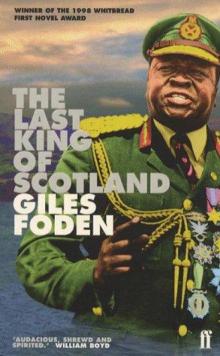 The Last King of Scotland (1998)
The Last King of Scotland (1998)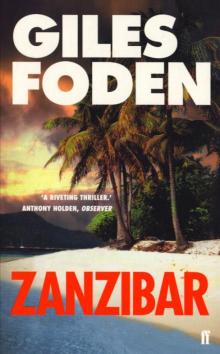 Zanzibar
Zanzibar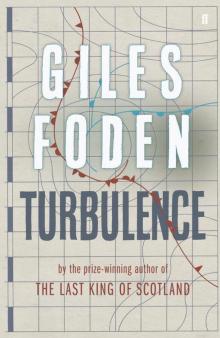 Turbulence
Turbulence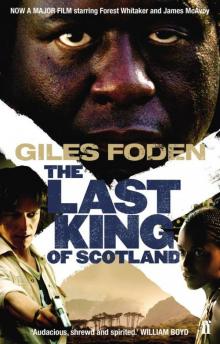 The Last King of Scotland
The Last King of Scotland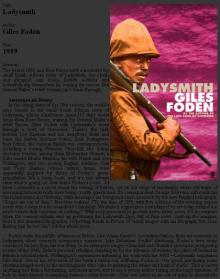 1999 - Ladysmith
1999 - Ladysmith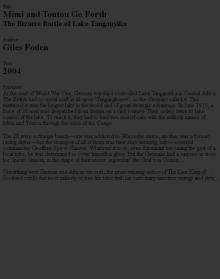 2004 - Mimi and Toutou Go Forth
2004 - Mimi and Toutou Go Forth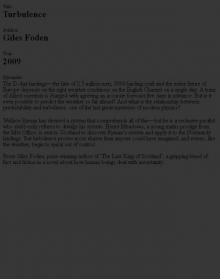 2009 - Turbulence
2009 - Turbulence